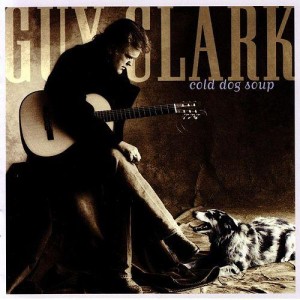 There’s something about Guy Clark’s songs that make them seem like old friends, even when you hear them for the first time. His collection Cold Dog Soup is no exception.
There’s something about Guy Clark’s songs that make them seem like old friends, even when you hear them for the first time. His collection Cold Dog Soup is no exception.
This Texas singer-songwriter is a true treasure. I can picture, a century from now, some music historian digging through the mountains of compact discs from the final quarter of the 20th Century — tons of trite, disposable cookie-cutter pop, country, rock and schlock — wearily putting on a Guy Clark disc and weeping in ecstasy.
There’s a reason that in 25 years of recording, he’s been a major influence on a whole generation of Texas country/folk singer-songwriters, including Lyle Lovett and Nanci Griffith, and his songs have been covered by the likes of Johnny Cash. With little more than a guitar and a poet’s ear for a well-honed phrase, Clark can tell stories that’ll make you laugh, cry, chuckle and sigh. And shake your head in awe at the sheer art of his craft.
Cold Dog Soup is a superb collection of songs. Most of these tracks were laid down “live” in a Nashville studio, with Clark, Verlon Thompson and Darrell Scott sitting in a circle, playing and singing. A small handful of other musicians, including Emmylou Harris, provide harmony vocals or instrumental tracks. The liner notes make clear which parts were overdubbed, a bit of recording honesty I appreciate.
The 12 songs on this disc slip by in less than 45 minutes. Clark wrote two of them solo, co-wrote seven others, and borrowed three from the likes of Steve Earle and Anna McGarrigle. Every one’s a keeper.
If there’s a formula for a perfect country album, Guy Clark wrote it. Not that Cold Dog Soup is anything like formulaic, but all the elements are here. There’s the faded love song by Richard Dobson, “Forever, For Always, For Certain,” a waltz full of clever wordplay about broken hearts. “Forever ain’t easy to come by/For always ain’t never too sure.” There’s the touching ballad about a cultural icon, “Indian Head Penny.” Told in first-person, this one covers the long life of a coin, passed from hand to hand, losing a little value every year, but still filling a need — a delightful metaphor that never stoops to sentimentality. There are the songs about looking back at life with all its joys and regrets and just accepting it as it is. “You might be a saint, you might be a sinner/you might be Billy the Kid/You might crap out or roll a winner/It’s water under the bridge,” he sings in “Water Under the Bridge.” “Sun up to sundown/ridin’ herd on old memories/sundown to sunup/singin’ the bunkhouse blues,” in “Bunkhouse Blues.” There’s the bluegrassy story song about an old mountain musician, “Sis Draper,” with fine fiddling from Shawn Camp and banjo from Thompson. There’s the love song to a son or daughter, “Ain’t No Trouble to Me.” “Trouble be gone, trouble be damned/Love be trouble free/Come on home any old time…” he invites, and you wish you were his offspring.
Then there are the Texas songs. Like his compatriots Jerry Jeff Walker and Townes Van Zandt, Clark seems incapable of putting out an album without numerous references to his home state. “Red River” is a loving homage to the Lone Star State of mind. “Here’s to one and all of us Red River Fools,” he sings at the end of this song about his great-grandfather and other past Texans. Oh, and don’t forget the joke song, probably inspired by past exploits of Clark, Walker, Ramblin’ Jack and who-knows who else, “Men Will be Boys.” Every Texan has a need to do a little philosophizing, and Clark’s no exception. Two songs fit the bill here. “Gotta get out on the floor if you want to do the dance,” he opines in “Die Tryin’.” “Ain’t no money in poetry, that’s what set the poet free,” goes the chorus in the title song, “Cold Dog Soup,” which is part talking blues, part cowboy poetry, part hobo jungle ballad, and all Guy Clark.
Harris contributes her on-the-nose harmony vocals on Steve Earle’s elegy to Van Zandt, “Fort Worth Blues,” and on the album closer, Keith Sykes’ and Anna McGarrigle’s “Be Gone Forever.” “I can tell when Guy likes stuff,” says his wife Susanna Clark in the liner notes. “He likes this stuff, I can tell.” And you can tell. You can just almost see Clark, Thompson and Scott grinnin’ like racoons as they perform these songs.
All are sung, of course, in Clark’s trademark voice, a slightly gravelled baritone that warms you like a glass of mellow sippin’ whisky. It’s all enough to make you wish he was your favorite uncle, singing these songs to you on your front porch as the sun goes down. The next best thing is to slip a Guy Clark CD in the player, close your eyes and let him transport you to his front porch. Excuse me, I believe I’ll go do that myself.
(Sugar Hill, 1999)
